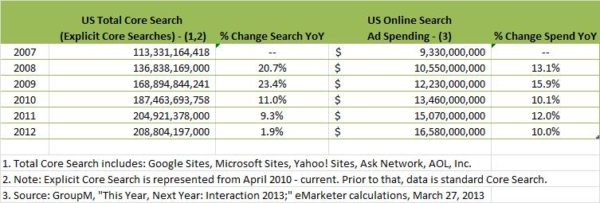Welcome To The Mobile Era Of Search
It’s rare when you can pinpoint the moment of a major game changer for an industry to a single day. Usually, these shifts happen over time; and then one day, you look back and realize how momentous a particular event really was. For paid search, there have been many catalysts that have accelerated the industry, […]
It’s rare when you can pinpoint the moment of a major game changer for an industry to a single day. Usually, these shifts happen over time; and then one day, you look back and realize how momentous a particular event really was.
For paid search, there have been many catalysts that have accelerated the industry, most of which were not even specifically search related.
For example, the widespread availability of consumer-priced, high-speed Internet access took years to mature and was the result of multiple global telecoms working in parallel. This development led to more daily time spent on the Web — and with more people spending more time online, search queries increased, thus raising the usage and revenue of paid search.
Even Quality Score (QS), first introduced in July of 2005 and arguably the biggest change in paid search’s short history, took years to tweak and is probably still being tinkered with by the mad scientists in Mountain View and Redmond.
Before QS, advertisers with big pockets could literally buy any keyword they wanted to without penalty. A soft drink brand, for example, could buy up every term related to their audience categories — snowboarding, skateboarding, punk rock, video games, etc. The introduction of QS helped to clean up the sponsored listings on the Search Engine Results Pages (SERPs), and paid search grew even more valuable to advertisers and consumers.
So, you can understand why I find it amazing that I can look at my calendar right now and see the actual date of this industry’s newest game changer. It was announced last month on the AdWords blog at the bottom of a straightforward post revealing that ad group level bidding would accompany the rollout of enhanced campaigns: “We will begin automatically upgrading all AdWords campaigns to enhanced campaigns starting on July 22, 2013.”
BANG! And they’re off!
As I start wrapping my head around how the second decade of modern paid search will be affected by this change, the data geek in me immediately reaches for the numbers. Below are the U.S. total searches from comScore’s qSearch and U.S. online search ad spending from GroupM. (Note that the qSearch data is for core searches, i.e., from the five major search engines, and doesn’t include mobile search.)
As you can see, we’re looking at some pretty big numbers! Queries and spend have both been rising. Last year, in the U.S. alone, over 208 trillion search queries were performed, and $16.5 billion was spent on search ads by marketers. In the far-right column, you can see the double digit year-over-year (YoY) growth in paid ad spend since 2007.
However, there was a severe drop-off in YoY desktop search queries beginning in 2010. Does this mean we’re seeing the plateauing of search? Well, sometimes you have to dig a bit deeper into the numbers. I think we all know by now that answer lies in the rise of mobile search.
There’s good supporting evidence for this conclusion including the fact that 2010 was proclaimed the Year of Mobile. From our own data at Kenshoo released last month, almost one out of every five paid search clicks are coming from mobile device, accounting for almost 15% of total ad spend:
“Search has been formative to the emergence of the consumer Web we know today and deserves credit for first attracting ad dollars to digital in a meaningful way,” says Eli Goodman, SEM expert and Media Evangelist at comScore. “Consumers are continuing to search more often and across more platforms – a sign that this market still has a great deal of growth and evolution in front of it.”
Evolution is the right word for it. We’re not just seeing paid search fragmenting from desktop browsers to the mobile browser versions of search engines; we’re also seeing vertical search, app search, etc. Major ecosystem players (with deep pockets) that have conceded desktop search to the big boys see mobile as a new frontier where they may actually be able to compete.
So, yes, enhanced campaigns are a major game changer. But, this evolution is not being driven by Google or Microsoft or Yahoo — it’s all being driven by consumers and their appetite for mobile, Web-enabled devices. The Internet is one of the greatest tools ever invented, and search is how we best navigate our way through the petabytes of webpages.
“Smart device owners have taken one of the desktop Internet’s core functions with them on-the-go,” explains Jason Armitage, Principal Analyst at the Yankee Group. “Mobile search is closely linked to location and real-time activities. Users want results as they go through their daily routine in stores, in transit, or in front of the TV. The marketing potential for searches conducted on smart devices is not lost on advertisers. Mobile search ads are appealing to companies of all sizes, from the biggest brands to the smallest coffee stand.”
So, even though the rise of mobile paid search was inevitable (to me), Google’s mandatory switch to enhanced campaigns in AdWords on July 22nd is the bang of the starting gun for the new, mobile era in search.
Get ready to sprint.
Contributing authors are invited to create content for Search Engine Land and are chosen for their expertise and contribution to the search community. Our contributors work under the oversight of the editorial staff and contributions are checked for quality and relevance to our readers. The opinions they express are their own.
Related stories
New on Search Engine Land

